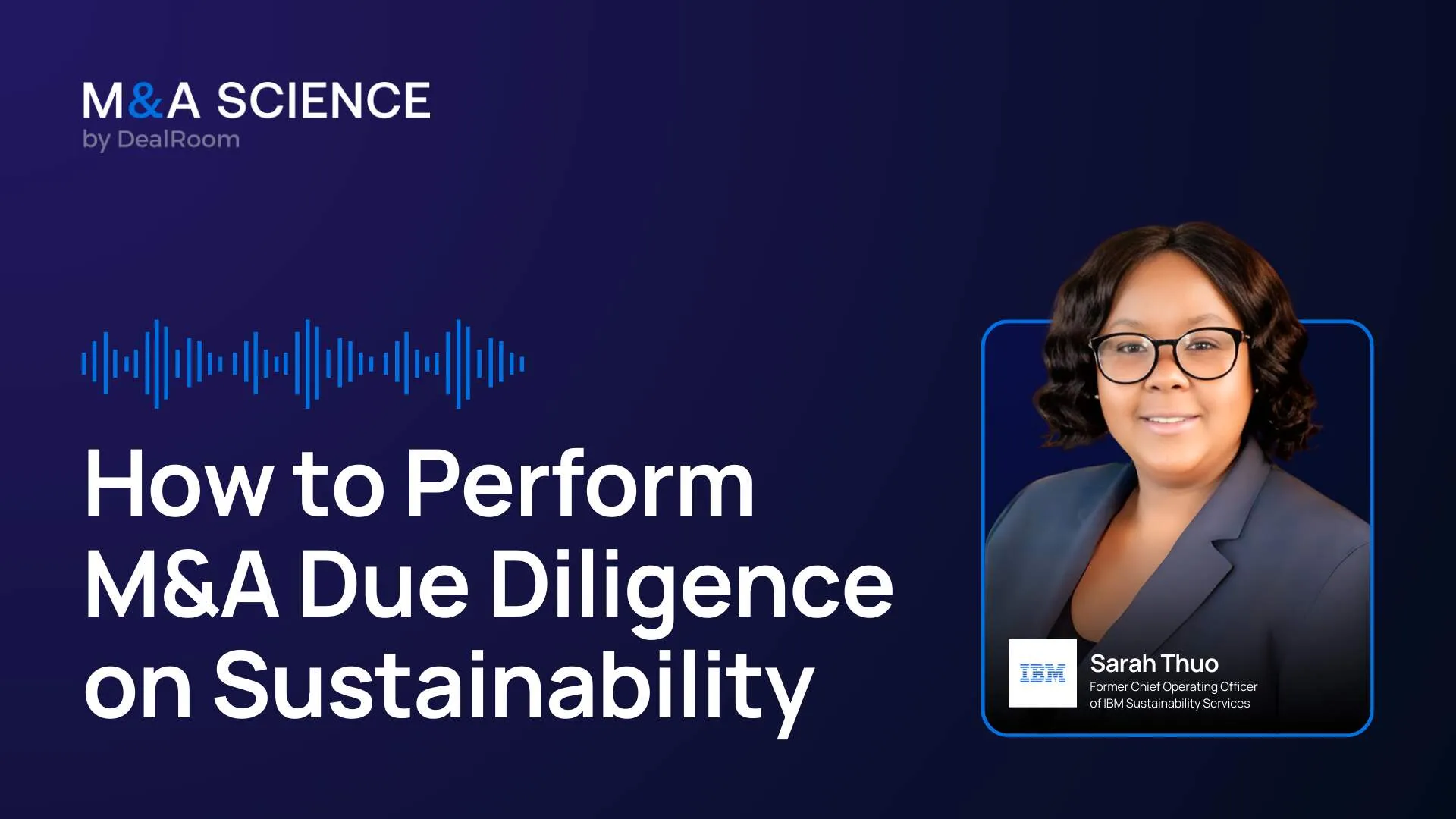
At IBM, more than work gets done; creation takes place. IBM creates as technologists, developers, and engineers, alongside partners and even competitors. For those seeking to improve the world through technology, infrastructure, software, and consulting, IBM is the ideal collaborator. The company is dedicated to helping every creator turn their "what if" into "what is," aiming to create something that will change everything.
Sarah Thuo
Sarah Thuo is a Partner/Principal at EY Parthenon, leading Sustainable Supply Chain service offerings. With a robust background in supply chain and operations, her career spans management consulting and industry, including roles at IBM where she served as Partner and Americas Practice Leader for Sustainability Business Transformation Services, and Partner and COO at IBM Global Sustainability Services. Sarah is an M&A and operations executive passionate about creating resilient and sustainable supply chains, with a proven track record in successful transformations for leading brands.
Episode Transcript
Importance of sustainability
As the effects of climate change become more apparent, businesses are recognizing the need to adapt their operations to minimize their impact on the environment.. We have seen increasing disasters causing real supply chain disruptions, such as the droughts in Europe this past summer that caused worldwide disruption by stressing vessel routes.
In addition, businesses are waking up to the intersection of social issues and business. Paul Paulman, the former CEO of Unilever, once said - "Businesses cannot succeed in failing societies." And that is more true now than it has ever been.
For example, the war in Europe has drastically increased the global costs of many commodities like oil and wheat.
Businesses also understand that issues such as human rights are important to their stakeholders. It's part of the reason why the US saw a huge reaction from American businesses with empathy and action to the death of George Floyd.
The third reason is increasing pressure from shareholders and customers for companies to run sustainable and responsible businesses. Shareholders, employees, and customers are demanding more transparency and accountability from companies regarding their ESG initiatives.
An example that comes to mind is in 2021, Exxon lost some board seats to an activist environmental hedge fund. So their shareholders and customers are demanding sustainability from these companies.
And lastly, there's increased regulation that's driving sustainability action. Governments around the world are now mandating sustainable business practices, with Europe leading the way. What starts in Europe makes its way across the pond.
Convincing people to participate in sustainability
There is a real need for education in sustainability and what it means. In the US, especially, the issue has become politicized, which is very sad. It takes away from the real urgency and action that's needed, especially around environmental concerns.
My encouragement is to look into some of the publications that are out there from universities and world-renowned journalists around sustainability and the real effects of global warming. There's real scientific proof of the urgency of action needed to combat some of the issues we're facing right now.
But in terms of action, greenwashing is very much an issue with businesses dealing with sustainability. The good thing is, there are now more ways to measure and demonstrate impact on environmental issues, social issues, as well as governance issues.
Regulating sustainability
So across the world, there are increasingly bold requirements for transparent, compliant, and responsible business practices, and not just practices, but also reporting. So these cover all aspects of sustainability. They range from environmental issues, social issues and governance.
A couple of examples start right here in the US. The SEC, for example, has proposed a new ruling for climate action. The proposed law would require publicly listed companies to provide climate-related financial data and greenhouse emissions insights in public disclosure filing. This would start in the fiscal year 2023.
Similarly, in the UK, the regulatory bodies there require companies to start reporting on climate action using the task force for climate-related financial disclosures. And it's starting with the most prominent companies this year and has to be adopted across the UK by 2025.
So we see regulatory bodies, governments waking up to the need to have a standardized way of reporting on sustainability and capturing the action on the social side. For example, there's a German supply chain Due Diligence Act, which goes into effect in January of 2023.
This law requires companies to perform due diligence across multiple tiers of their supply chains and to ensure that there are no human rights abuses such as child labor, slave labor, and safe working conditions, not just with tier-one suppliers but deep in the supply chain.
So governments are certainly waking up to the need for due diligence, standardized reporting, and compliance to widely accepted sustainability standards.
Identifying real players
With anything that consumers, shareholders, and stakeholders are making up to, an entrepreneurial spirit always wants to take advantage of people's concerns. Which is not a bad thing because it moves science forward. But I agree, many companies are moving towards this space just because it's the "in" thing.
And the dust needs to settle, but there's also a reality of other things happening in the business.
- There's a possible recession coming.
- Key issues like wars are happening right now in the world.
So at least on the business side, there will be enough pressures outside of sustainability that will really focus the companies on what we need to do on sustainability today.
Not just in terms of giving us a great brand and having people perceive us as a socially and environmentally stable and stewarding firm, but as companies that are making a real impact across the board financially and in terms of sustainability.
Evolution of sustainability
We've been working with some CPG companies to help them understand what is important to them. They are under a lot of pressure right now, and commodity prices have exploded. They're trying to balance listening to demanding customers, increasing sustainability with the cost of doing business with affordability.
And so to them, they need to be clear on where their focus should be, especially for publicly traded companies that need to, quarterly, show that they are doing the right thing to the markets.
We've been helping them really hone in on the importance of sustainability in your company for the stakeholders.
Whether it's shareholders, consumers, or employees, it's important to show them how to leverage certain sustainability aspects for a winning business proposition.There are many examples where sustainability drives good business and transparency that we have not seen before.
Risks of unsustainability
Sustainability is inherently linked with risk mitigation. So besides the fines and litigation that can result in non-sustainable practices, I usually try to help my clients think of what they are missing out on by not being sustainable.
- Stronger brand equity
- Increased customer loyalty
- Younger generations are seeking careers that align with their values and purpose, making sustainable businesses more attractive to top talent.
- Sustainable companies often have lower costs of capital, making them more attractive to investors.
So sustainability is good for business. And non-sustainable practices are increasingly going to become very costly for businesses.
- Regulatory fines
- Customers are fleeing for brands that are a lot more sustainable
- A higher cost of capital is many times associated with a lack of transparency.
Balancing ESG initiatives with business economics
It's a struggle for most companies today, especially high emitters. So if you think of oil and gas companies, their core business is not great for the environment. But they are starting to embrace that and pivot for the new world.
For example, some have gone into the EV business, and they're trying to create a whole new business out of electric vehicles.
And other technologies that are a lot lower emissions, rather than thinking of it as a cost of doing business, really successful companies are looking at what are the other opportunities that this brings on and how they can become a first mover and have an advantage as a sustainable business.
A lot of it is self-disruption, and it's also in keeping with the times.
“Change is inevitable, and a business that doesn’t change is usually a business that’s dying away. Embracing change and understanding how to thrive in that change is the way to go with sustainability.” - Sarah Thuo
Increasing enterprise value
The positive earned media is great in terms of brand equity, but also, you can get a stronger financial valuation through transparent reporting, which is part of ESG. And improved financial performance through enhanced corporate governance. These are some of the levers that you can use for better financial valuation through sustainability.
Other benefits are things like future-proofing. Sustainability regulations are on the rise globally, and embracing sustainability means that you're future-proofing your company for what is required in the future.
Imagine companies that don't do emission reporting today. If the SEC ruling does come through in 2023, that's a huge cost of business to actually start from scratch. As sustainability regulations continue to evolve, embracing sustainability helps companies stay ahead of the curve and future-proof their operations.
Lastly, breathable air for all of us and lasting social good is the real impact all of us should be going for.
Carbon credits
Carbon credits are tradable certificates or permits representing the right to omit a certain amount of greenhouse gas into the air. So what they represent is an equivalent offset project, such as reforestation, that would sequester the same amount of greenhouse gases from the atmosphere.
So imagine a manufacturing company, for example, that has published net zero ambitions by 2030. But in their supply chain, they're not really able to change their processes enough to emit zero greenhouse gases into the air.
So what they do is they buy carbon credits to ensure that any emissions they have through their operations or their supply chain partner are offset by projects represented by the carbon credit certificates that they buy.
Performing diligence on sustainability
It's one of the more complex types of diligence that you can do. But simply put, it's the assessment of how a company complies with either regulatory company set or widely accepted regulations and expectations across ESG key performance indicators (KPIs). The relevant KPIs will vary depending on the industry, geographic scope, and the company's own commitments.
And the first step is to understand the ESG KPIs of the target company, which depends on the geography or industry you are in. For a chemicals manufacturing company in North America, I would look at some of the big chemicals KPIs such as hazardous waste, materials management such as safety for their workers, and safety for the end consumer.
And I'd also be looking from a regulatory perspective; where do they sit? So are they in a state that's highly regulated in terms of what they can do with their facilities? And if I look at the US-wide, how does the SEC's upcoming regulation on GHG emissions and climate-related financials affect them? So these are some of the questions I would start asking. Okay.
A lot of companies are already doing annual reporting on their ESG efforts. But, worst case scenario, if you're dealing with a smaller company, a non-publicly listed company, this is information you'll have to gather.
The second step is assess how they are performing compared to the expected standards set by regulations, customers, or peers.
And then, the output is the results of those KPIs. How is the company doing against the different KPIs for the different ESG KPIs? Then, evaluate their future performance based on their operations, growth goals, and supply chain changes.
Deal impact
It depends on a lot of factors. It depends on the buyer and the industry, and it depends on what you find. For example, some buyers are very risk averse, and they certainly see that if a company is not doing good in terms of sustainability, then its future is not great. And so that would probably negatively affect the valuation or their willingness to do the deal.
There are other companies that are willing to help companies that are bad at sustainability become more sustainable in the future. But, worst case scenario, some companies don't care about sustainability and see it as nice to have.
I have seen a deal almost fail because of environmental concerns. I was dealing with a company that had very hazardous chemicals, and some of the labeling was an issue compared to the standards of the acquiring company. That almost became a deal breaker. There were a lot of corrective actions that had to be put in place before the deal went through.
So it's a lot more important to some companies and industries, and it also depends on the severity of the issue. Obviously, when it's much more tied to regulatory concerns, it becomes a much bigger issue than when it's tied to consumers' wants.
Industry-specific ESG
It looks different in each industry, but overall, it's the practice of ensuring that businesses lead to a positive impact on the environment for the community that it affects. In terms of governance, another example would be life science.
We are helping some of our life sciences clients think about issues such as their own environmental impact through their production, but also the health impact of their operations.
Publicity stunt
There are companies that are not very sustainable but have the market illusion of sustainability. Dealing with them has become less of an issue because of the requirement of reporting and transparency. So the more educated we become as investors, consumers, and shareholders on sustainability, the more we demand transparency and accountability for stated impact.
You will see in the SEC ruling that you need to show how you are cutting emissions versus offsetting. And so the fact that this will become transparent for public companies is huge because you actually get to see a company's commitment through its own operations.
It's fine to be skeptical, just like anything else. Nothing should be taken at face value, but the science becomes better, and as the KPIs become more transparent will be able to make better determinations on whether a company is sustainable or not.
It's both internal and external. Many employees are talking about impact and rethinking the way they do daily and understanding what they want to do with their careers and how it aligns with their values.
It has become something that companies cannot move away from and something that they need to prove as employees, shareholders and consumers are pushing toward sustainability.
Leading sustainability initiatives
For leaders in sustainability, they have a chief sustainability officer in charge. But for companies who do not have this function, their ESG sits in the corporate environmental affairs team or the legal team. Sometimes it also sits on the chief operating officer or supply chain officer. In very rare cases, the CFO owns a part of sustainability.
It's highly cross-functional, but many companies are now starting to see the need for a chief sustainability officer who brings all of this together. That will be the person working hand in hand with the due diligence team.
Why do you live the chief sustainability officer would be able to provide all the information that a due diligence team would need. In addition, they will be able to showcase the materiality assessment team done for their own company and show why they focus on specific KPIs and not others.
Do's and don'ts of ESG diligence
Some of the do's include:
- Thoroughly reviewing the target company's ESG initiatives, rather than simply relying on their reporting.
- Staying informed about the sustainability trends and ESG initiatives of their peers in the industry.
- Understanding the existing and upcoming regulations surrounding sustainability.
Some of the don'ts include:
- Taking things at face value.
- Being cautious of "greenwashing" - when companies make false or exaggerated claims about their sustainability efforts.
Greenwashing means when a company represents itself as responsible from an environmental perspective when it isn't. For example, a company claims that most of its products are recyclable. But how much of their products are actually being recycled?
There's a big difference between ambition and action, which people should be aware of.
- Don't solely focus on environmental issues. While emissions are important to make sure you have a sustainable world, they are not the only issue that should be on the table.
Outside of emissions there are social issues that are important to many stakeholders and certainly governance is a big thing in terms of ensuring transparency and ensuring that the company is doing the right thing in the long term.
M&A Software for optimizing the M&A lifecycle- pipeline to diligence to integration
Explore dealroom

Want to wear your M&A expertise?
Check out the M&A Science store.

.webp)



.jpeg)
